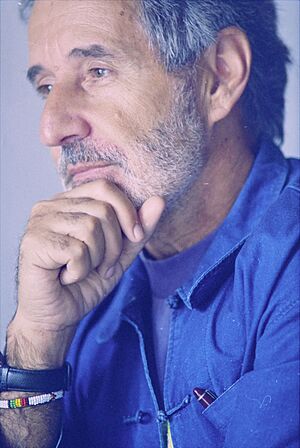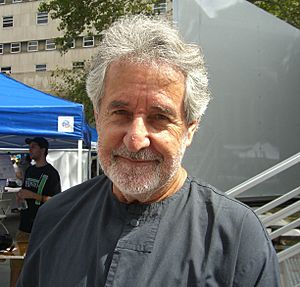Breyten Breytenbach facts for kids
Quick facts for kids
Breyten Breytenbach
|
|
|---|---|

Breytenbach in 1995
|
|
| Born | 16 September 1939 Bonnievale, Cape Province, South Africa |
| Died | 24 November 2024 (aged 85) Paris, France |
| Occupation | Novelist, essayist, poet, painter |
| Language | Afrikaans, English |
| Citizenship |
|
| Alma mater | University of Cape Town |
| Notable awards |
|
| Spouse | Yolande |
| Relatives | Jan Breytenbach (brother) Cloete Breytenbach (brother) |
Breyten Breytenbach (born 16 September 1939 – died 24 November 2024) was a famous writer, poet, and painter from South Africa. He became well-known around the world for speaking out against apartheid, which was a very unfair system of racial separation in South Africa. He was also a political prisoner because of his strong beliefs.
Breytenbach was a founding member of the Sestigers, a group of writers who challenged the government. He is considered one of the most important poets in Afrikaans literature.
Contents
Early Life and Education
Breyten Breytenbach was born on 16 September 1939 in Bonnievale, South Africa.
He went to high school at Hoërskool Hugenote in Wellington, Western Cape. Later, he studied fine arts at the Michaelis School of Fine Art at the University of Cape Town.
Fighting Apartheid
In the early 1960s, Breytenbach strongly disagreed with the ruling National Party and its apartheid policy. This policy treated people differently based on their race, especially favoring white people.
In 1961, he helped start the Sestigers. This was a group of Afrikaner writers who spoke out against the government.
He moved to Paris, France, where he married Yolande, a French woman of Vietnamese background. Because of the laws in South Africa at the time, which made it illegal for people of different races to marry, he was not allowed to return home.
Arrest and Imprisonment
In 1975, Breytenbach secretly traveled back to South Africa using a fake passport. He was arrested and put on trial. He was accused of trying to start a group called Atlas or Okhela. This group was meant to be a branch of the African National Congress (ANC) for white people.
He was found guilty and sentenced to nine years in prison. He ended up serving seven years. His book, The True Confessions of an Albino Terrorist, published in 1984, shares his experiences in prison.
Release and Later Life
After many international protests, Breytenbach was released from prison in 1982. He went back to Paris, where he lived for the rest of his life. He also became a French citizen.
After free elections ended apartheid in 1994, Breytenbach visited the "new South Africa" in December 1993. He continued to visit regularly and also spent time in the United States and Europe.
In 2000, he became a visiting professor at the University of Cape Town. He also taught at other universities like Princeton University and New York University.
Breytenbach was a founding member and board member of the Gorée Institute in Dakar, Senegal. This institute grew from a historic meeting in 1987, called the Dakar Conference. At this meeting, exiled leaders of the ANC met with liberal South Africans, mostly Afrikaners. They discussed ways to fight apartheid, which helped lead to its peaceful end.
His Creative Works
Breytenbach wrote many poems, novels, plays, and essays. Most of his works were in Afrikaans. Many of his books have been translated into different languages.
His first published work was a poetry book called Die Ysterkoei Moet Sweet ("The Iron Cow Must Sweat") in 1964. It was seen as very new and important in Afrikaans poetry. It presented "powerful and surprising ideas" without using traditional poetry styles.
While he was in prison, Breytenbach wrote five books of poetry and English prose. One of his prison poems was "Ballade van ontroue bemindes" ("Ballade of Unfaithful Lovers"). In this poem, he compared himself and other Afrikaner writers who spoke out, like Ingrid Jonker, to "unfaithful lovers" who had left Afrikaans poetry.
In 1984, he published his prison memoir, The True Confessions of an Albino Terrorist.
Art and Paintings
Breytenbach was also a talented painter. His paintings have been shown in many cities around the world, including Paris, Amsterdam, New York City, and Hong Kong. His art often has a surreal style, showing animals and people who seem to be trapped.
In 2018, he had a special art show in Cape Town called The 81 ways of letting go a late self. It featured his new and older artworks.
Personal Life and Legacy
From 1962 until his death in 2024, Breytenbach was married to Yolande Ngo Thi Hoang Lien. She was born in Vietnam and grew up in France. They had a daughter named Daphnée and two grandsons.
Breytenbach passed away in Paris, France, on 24 November 2024, at the age of 85. His wife Yolande was with him.
He was the younger brother of Jan Breytenbach, a military commander who had very different political views from him. His other brother, Cloete Breytenbach, was a famous war photographer.
Many Afrikaans speakers now think of Breytenbach as their unofficial poet laureate. He was one of the most important poets in Afrikaans literature during his lifetime.
Honours and Awards
French Honours
- Chevalier de la Legion d'Honneur (Knight of the Legion of Honour)
- Commandeur des Arts et Lettres (Commander of Arts and Letters – France's top cultural award)
Literary Awards
- CNA Award (5 times)
- 1965: APB Prize
- 1968: Reina Prinsen Geerligs Award
- 1972: Lucy B. and C.W. van der Hoogt Prize
- 1984, 1999, 2008, & 2010: Hertzog Prize (He refused the 1984 prize.)
- 1982: Van der Hoogt Prize
- 1985: Anisfield-Wolf Book Award for Fiction
- 1986: Rapport Literature Prize
- 1994: Alan Paton Award
- 2007: University of Johannesburg Prize for Creative Writing
- 2007: W.A. Hofmeyr Prize
- 2007: Hertzog Prize
- 2010: Mahmoud Darwish Award for Creativity
- 2010: Max Jacob Prize
- 2017: Zbigniew Herbert International Literary Award
- Jan Campert Prize, special prize
- Jacobus van Looy Prize (for literature and art)
- Perskor Prize
- International Publishers Prize, special prize
Works
Breytenbach's work includes many novels, poetry collections, and essays. Many of these are in Afrikaans. His works have been translated into many languages, including English, Dutch, German, French, Arabic, Polish, and Spanish. He is also known for his paintings and prints, which have been shown in cities worldwide.
Poetry in Afrikaans
- The Iron Cow Must Sweat (Die ysterkoei moet sweet), 1964
- The House of the Deaf (Die huis van die dowe), 1967
- Gangrene (Kouevuur), 1969
- Lotus, 1970
- The Remains (Oorblyfsels), 1970
- Scrit. Painting Blue a sinking Ship. (Skryt. Om 'n sinkende skip blou te verf), 1972
- In Other Words (Met ander woorde), 1973
- Footnote (Voetskrif), 1976
- Sinking Ship Blues, 1977
- And Death White as Words. An Anthology, 1978
- In Africa even the flies are happy, 1978
- Flower Writing (Blomskryf), 1979 (Selected poems)
- Eclipse (Eklips), 1983
- YK, 1983
- Buffalo Bill, 1984
- Living Death (Lewendood), 1985
- Judas Eye, 1988
- As Like (Soos die so), 1990
- Nine Landscapes of our Times Bequeathed to a Beloved (Nege landskappe van ons tye bemaak aan 'n beminde), 1993
- The Handful of Feathers (Die hand vol vere), 1995 (Selected poems)
- The Remains. An Elegy (Oorblyfsels. 'n Roudig), 1997
- Paper Flower (Papierblom), 1998
- Lady One, 2000 (Selected love poems)
- Iron Cow Blues (Ysterkoei-blues), 2001 (Collected poems 1964–1975)
- Lady One: Of Love and other Poems, 2002
- The undanced dance. Prison poetry 1975 – 1983 (Die ongedanste dans. Gevangenisgedigte 1975 – 1983), 2005
- the windcatcher (Die windvanger), 2007
- Voice Over: A Nomadic Conversation with Mahmoud Darwish, 2009
- Catalects (Artefacts for the slow uses of dying) (Katalekte (artefakte vir die stadige gebruike van doodgaan)), 2012
Prose in English
- Catastrophes (Katastrofes), 1964 (stories)
- To Fly (Om te vlieg), 1971 (novel)
- The Tree Behind the Moon (De boom achter de maan), 1974 (stories)
- The Anthill Bloats … (Die miernes swell op ...), 1980 (stories)
- A Season in Paradise (Een seizoen in het paradijs), 1980 (novel, uncensored edition)
- Mouroir: Mirror Notes of a Novel, 1983
- Mirror Death (Spiegeldood), 1984 (stories)
- End Papers, 1985 (essays)
- The True Confessions of an Albino Terrorist, 1985
- Memory of Snow and of Dust, 1987 (novel)
- Book. Part One (Boek. Deel een), 1987 (essays)
- All One Horse. Fiction and Images, 1989
- Sweet Heart (Hart-Lam), 1991 (essays)
- Return to Paradise. An African journal, 1992 (which won the Alan Paton Award)
- The Memory of Birds in Times of Revolution, 1996 (essays)
- Dog Heart. A travel memoir, 1998
- Word Work (Woordwerk), 1999
- A veil of footsteps, 2008
- All One Horse, 2008
- Mouroir: Mirror Notes of a Novel, 2008
- Intimate Stranger, 2009
- Notes From The Middle World: Essays, 2009
CDs
- Mondmusiek (2001)
- Lady One (2002)
See also
 In Spanish: Breyten Breytenbach para niños
In Spanish: Breyten Breytenbach para niños
- Sestigers
- Zbigniew Herbert International Literary Award
 | Valerie Thomas |
 | Frederick McKinley Jones |
 | George Edward Alcorn Jr. |
 | Thomas Mensah |


